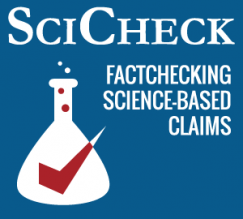Posts Misinterpret NYC Health Tweet About Omicron Subvariant XBB.1.5
SciCheck Digest
An unclear tweet from New York City health officials was meant to caution residents that the latest omicron subvariant, XBB.1.5, might be more likely than previous variants to infect vaccinated or previously infected people. Social media posts misinterpreted the tweet to mean that vaccinated people were at higher risk than unvaccinated people.

Full Story
In the U.S., an omicron subvariant known as XBB.1.5 has rapidly spread over the last several months, particularly in the Northeast. While the subvariant is highly transmissible and may be more immune evasive than other variants, there is no sign that vaccination is not beneficial or that vaccinated people are more likely to be infected than unvaccinated people.

Yet the incorrect notion that vaccinated people are more susceptible than unvaccinated people to the variant has been spreading on social media, thanks to posts misinterpreting a Jan. 13 tweet from the New York City Department of Health and Mental Hygiene, also known as NYC Health.
“Omicron subvariant XBB.1.5 now accounts for 73% of all sequenced COVID-19 cases in NYC,” the department’s tweet began. “XBB.1.5 is the most transmissible form of COVID-19 that we know of to date and may be more likely to infect people who have been vaccinated or already had COVID-19.”
The imprecisely worded tweet was quickly misconstrued to mean that vaccinated people were at higher risk of infection than unvaccinated people, rather than — as intended — at a higher risk of infection with the new variant compared with previous ones.
“Name me one other vaccine/treatment that increases your risk of contracting the disease its ‘SUPPOSED’ to be giving you protection from?” asked a Jan. 16 Instagram post, sharing a screenshot of an Epoch Times story reporting on the tweet.
The Epoch Times is a conservative outlet affiliated with a Chinese spiritual movement and is known for spreading COVID-19 misinformation. In this case, its article doesn’t contain outright falsehoods and at times even provides good, accurate information about the new variant and the vaccines.
But the Epoch Times story never explains that the possible increased risk of infection with XBB.1.5 is relative to prior variants — and the headline only mentions the risk for people who are vaccinated. The tweet, of course, had also referred to those who were previously infected.
An article from Fox News, which was republished in the New York Post, covered the tweet in a similarly confusing fashion, also topped with an easily misunderstood headline: “Omicron subvariant XBB.1.5 possibly more likely to infect those who are vaccinated, officials say.”
The story and the erroneous takeaway were then shared by readers and spreaders of vaccine misinformation, such as Robert F. Kennedy Jr., on Facebook and other social media sites.
In a Jan. 17 tweet, NYC Health clarified that its statement about increased infection risk was “compared to prior variants.” But the incorrect interpretation of the tweet had already spread.
Misinformation Spreaders Capitalize on Poorly Worded Tweet
It’s worth noting that while NYC Health’s original tweet was poorly worded, additional information present on the department’s website at the time made clear that the elevated risk of infection was relative to other variants, not to unvaccinated people.
“It may be more likely to infect people who have been vaccinated or previously had COVID-19 compared to prior variants,” a department webpage said of XBB.1.5 as early as Jan. 13, in language otherwise nearly identical to the tweet.
The tweet itself was also accompanied by a graph showing the growing prevalence of the subvariant in the city over time, hinting at the correct meaning — and a subsequent tweet emphasized the importance of COVID-19 vaccination, including the updated booster shots.
Some posts and commenters picked up on this supposed discrepancy, wondering why officials would recommend vaccines if vaccinated people were at higher risk of infection than unvaccinated people.
“This makes zero sense! First they admit that being vaxxed can make you more susceptible. Then they tell you to get vaxxed to protect yourself,” one Facebook user wrote in reply to the New York Post article.
But of course, the health department wasn’t saying that vaccination puts people at higher risk.
No Evidence Vaccination Increases Risk of XBB.1.5 Infection
The notion that the COVID-19 vaccines increase infection risk is a misconception we’ve seen before. In June, we debunked the same claim, that time based on some cherry-picked data from Walgreens. As we explained then, it’s true that the vaccines have become less effective against infection than they once were, as new variants evolved and immunity waned. But numerous studies have shown that even against omicron, the original shots still provided at least some temporary protection against infection.
There isn’t much data yet to say if that is still the case with XBB.1.5, or to say how well the updated boosters in particular fare in preventing infections. Updated boosters targeting both the original strain of SARS-CoV-2, the virus that causes COVID-19, and the BA.4 and BA.5 omicron subvariants became available for adults in the U.S. in September. XBB.1.5 is most similar to the BA.2 variant, having formed from the recombination of two such variants, plus some additional mutations.
Lab studies suggest that XBB.1.5 is likely to be among the most immune evasive variants thus far, meaning that the variant is able to sidestep immunity protection people have from vaccination or prior infections — at least in terms of evading antibodies. It’s therefore reasonable to expect that the vaccines may not offer as much protection against infection as before — and likely why NYC Health was alerting people to the possibility, which also applied to previously infected people.
One study, published in the New England Journal of Medicine on Jan. 12, found that neutralizing antibodies among vaccinated people were lower against one of XBB.1.5’s predecessors, XBB, compared with other variants. Still, the antibody levels were higher in most people who received an updated booster.
In any case, there is no evidence to suggest that vaccination is counterproductive and leading to more infections.
In New York City, for example, where officials estimate around 80% of COVID-19 cases as of Jan. 7 were due to XBB.1.5, there continue to be far lower rates of COVID-19 cases, hospitalizations or deaths among vaccinated or boosted people compared with unvaccinated people.
It’s important to remember that antibodies aren’t the only defense against the virus — there are memory T and B cells as well — and scientists anticipate the vaccines will retain much of their ability to prevent severe disease and death, which is their primary goal.
Editor’s note: SciCheck’s articles correcting health misinformation are made possible by a grant from the Robert Wood Johnson Foundation. The foundation has no control over FactCheck.org’s editorial decisions, and the views expressed in our articles do not necessarily reflect the views of the foundation.
Sources
COVID Data Tracker. CDC. Accessed 20 Jan 2023.
“XBB.1.5 Rapid risk assessment.” World Health Organization. 11 Jan 2023.
nychealthy (@nycHealthy).“Omicron subvariant XBB.1.5 now accounts for 73% of all sequenced COVID-19 cases in NYC. XBB.1.5 is the most transmissible form of COVID-19 that we know of to date and may be more likely to infect people who have been vaccinated or already had COVID-19.” Twitter. 13 Jan 2023.
Musto, Julia. “Omicron subvariant XBB.1.5 possibly more likely to infect the vaccinated: officials.” Fox News. 14 Jan 2023.
nychealthy (@nycHealthy). “XBB.1.5 may be more likely to infect people who have been vaccinated or previously had COVID-19 compared to prior variants. Vaccination is still the best way to protect against hospitalization and death from COVID-19, including from these new variants: http://nyc.gov/covidvaccine.” Twitter. 17 Jan 2023.
“COVID-19: Data.” NYC Health. Accessed 20 Jan 2023 and web archived versions.
McDonald, Jessica. “Vaccinated People Not More Susceptible to COVID-19 Than Unvaccinated.” FactCheck.org. 10 Jun 2022.
McDonald, Jessica. “Q&A on Omicron-Updated COVID-19 Boosters.” FactCheck.org. 23 Sep 2022.
Browne, Ed. “Why COVID’s XBB.1.5 ‘Kraken’ Variant Is So Contagious.” Scientific American. 10 Jan 2023.
Hodcroft, Emma. “I’ve updated my #SARSCoV2 #22F/#XBB figure to show how it has evolved into XBB.1 & XBB.1.5.” Twitter. 6 Jan 2023.
Yue, Can et al. “Enhanced transmissibility of XBB.1.5 is contributed by both strong ACE2 binding and antibody evasion.” bioRxiv. 5 Jan 2023.
Davis-Gardner, Meredith E. et al. “Neutralization against BA.2.75.2, BQ.1.1, and XBB from mRNA Bivalent Booster.” New England Journal of Medicine. 12 Jan 2023.
McBride, Katie. “XBB.1.5 Is Spreading Rapidly Across The Country. Here’s Why You Shouldn’t Panic.” Inverse. 13 Jan 2023.
This article has been archived for your research. The original version from FactCheck.org can be found here.


